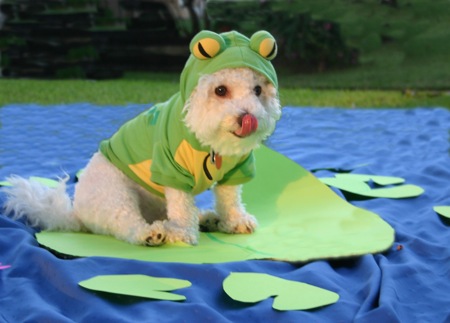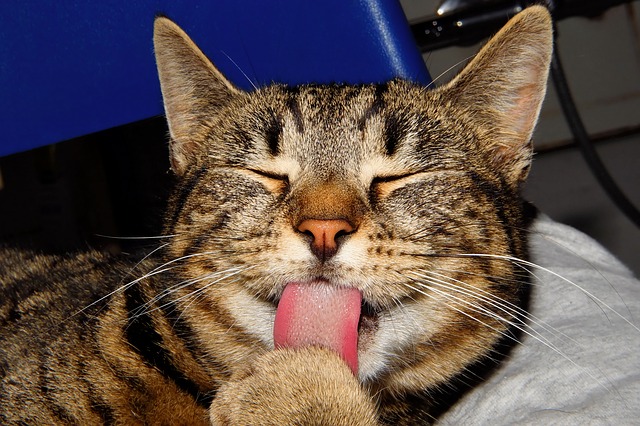Pet Licking Behaviour Problems
Why does my cat lick…? Why does my dog lick…?
Understanding Pet Licking Behaviour Problems: Summary
- Pets lick naturally but too much or inappropriate licking behaviour is unwanted by most owners.
- Management of the pet licking behaviour problem involves health checks and subtly interrupting any licking behaviour.
- Long term solutions involve looking after your pet’s needs to use their mouth, reducng any anxiety and providing appropriate activities for their mouths.
Understanding Pet Licking Behaviour Problems and Overgrooming
Does your pet lick a lot? They may lick themselves, you, your guests or other objects and it can be annoying or even hurt them. Licking behaviour is natural in the animal world but too much or inappropriate licking is not desirable behaviour by most owners.
Learn how to reduce pet licking behaviour problems with these tips from Dr Jo Righetti and Pet Problems Solved…
Causes of pet licking behaviour problems
Grooming behaviour
Most animals, cats especially, self-groom. This is natural behaviour but can become excessive, with overgrooming (read more below), due to conditions such as parasites, allergies or anxiety.
Many animals also like to groom others, including humans. Most animals are able to tolerate this grooming behaviour Some even indulge in mutual grooming, where they groom one another.
Tasting or exploring the world
Like humans babies, young kittens and puppies explore the world with their mouths. This leads to chewing and licking behaviour. Dogs continue chewing throughout their lives, sometimes to their owners’ dismay.
Most animals will be attracted to surfaces that have food on them.
Satisfying dietary needs
Licking may be a way of sampling what’s around you and animals may do this to try to make up for missing elements – vitamins or minerals – in their diet. Dietary deficiencies may also be caused by physiological conditions so have your pet checked at the vet.
Some animals seem particularly attracted to sweat, after you have exercised for example, or dirt, after gardening.
Sore mouths
Dogs and cats with sore mouths – teeth or gums – will often try to relieve the pain by licking or chewing on objects around them. A dental check will ensure your pet’s mouth is as healthy as possible.
Reducing anxiety
When animals feel anxious, activities such as self-grooming may calm them down. This is especially true of cats. If your cat is over-grooming, ask yourself if they could be anxious. Read more about cat anxiety.
OCD
Is your pet obsessive-compulsive? Do they lick the air for apparently no purpose at all? Again, this could be caused by anxiety or other medical conditions. Please speak to your vet.

Attention seeking
Our pets will often lick us to gain attention. This works as we push them away, shout at them to stop or glare at them. Sometimes we even laugh.
All of these humans responses will encourage your pet to lick you more.
Itchy skin
Allergies are common in pets and most excessive scratching and skin conditions are due to allergies. Skin conditions can also cause over-grooming.
Parasites can also cause your pet to groom more. Learn more about flea treatments to keep your pet parasite-free. Check with your vet.
Calming down
When dogs are stressed they may lick their lips or yawn. These are signals of mild stress and owners need to heed their dog’s signals. If your dog looks stressed, remove them from the situation.

How to reduce unwanted pet licking behaviour
You only need to reduce your pet licking, if it is an actual problem. Pets lick and groom themselves, especially cats, so check that this is not simply normal behaviour before you try to reduce it.
The following tips may help you reduce the unwanted pet licking behaviour, depending on the cause of the licking. (Remember it is always good to find out the cause, to solve the problem.)
Vet and diet check
Have your pet’s mouth and stomach checked and also their diet.
Your vet needs to help you with this but it may help to keep a diary of your pet’s behaviour.
Stop over-grooming
Look for patterns in the behaviour of your pet to alert you to when your pet is likely to be grooming themselves.
Prior to them beginning to groom, step in with something more appropriate to occupy their mouths e.g. food chew, toy.
More tips on overgrooming below.
Stop Pet Licking You?
If you want your pet to stop licking you, look for the cause of the licking. In most cases it will be, or at least involve, attention seeking behaviour. Do not give attention to this behaviour.
Instead step in, before your pet starts licking you, with a distracting activity like a food chew or a toy.
Until your pet gets the idea, you might want to wear long rubber gloves to protect your arms from being licked. After all, that tongue has been to a lot undesirable places!
Why your pet licks, chew or overgrooms themselves
One form of unwanted pet licking behaviour is overgrooming, where your pet spends too much time grooming or licking themselves.
Does your dog or cat spend hours nibbling, chewing or licking their paws or fur? While self-grooming is a form of hygiene which owners welcome, when performed excessively, it can also be a sign that something is wrong in your pet’s world. Here are some reasons why pets may overgroom and what you can do about it…
Reasons for over-grooming
There are many reasons why pets may overgroom. Many of these are related to the licking behaviour above but you may also get some clues as to why your pet is overgrooming here…
1. Skin conditions causing over-grooming
Many pets suffer from skin conditions and allergies and their excessive grooming, licking or chewing behaviour may be an attempt to relieve their itchiness. Common skin conditions include flea allergy, atopic dermatitis, food allergy dermatitis, mange and hotspots.
Consult your vet for diagnosis of skin conditions and allergies and treat your pet. Try products designed especially for itchy skin to help your pet cope.
2. Stress Overgrooming
Stress can cause many unwanted pet behaviours including excessive dog barking, hiding behaviour, inappropriate toileting and, in some pets, over-grooming. In cats, excessive grooming is known as psychogenic alopecia and cats will sometimes develop bald spots from their over-grooming.
Often, at some point, in the past, grooming or nibbling or chewing on their body has helped relieve some of your pet’s anxiety. This then becomes the behaviour they resort to whenever stressed.
It is important to remove the source of stress from your pet’s life, if possible. If they excessively groom when guests are present, for instance, you may need to conduct a program of gradual desensitisation with positive introductions to people. Consult an animal behaviourist if you need help with this.
You can also create a calming environment around your pet, especially where they are likely to over-groom. Calming, classical music may help, as can calming scents and dietary supplements.
Read more about dog anxiety and cat anxiety.
3. The Grooming Habit
Over-grooming can just become a habit. Licking and nibbling (read more above) has had a purpose and helped the animal in the past and now your pet just habitually grooms themselves. Often this habitual behaviour will be associated with a particular pattern of behaviour. It may be when you settle down in the evening to watch television. The grooming starts!
Prevention here is better than cure. When you know the behaviour is likely to start, have something else on hand to distract your pet, prior to the grooming starting.
If you give them a toy or chew treat when they are grooming, it will be a reward for grooming! Instead, we need to step in prior to the behaviour starting.
4. Attention-seeking grooming
Some animals like our attention and will do whatever they can to get it. If you have given your pet attention for grooming in the past, such as trying to stop them or speaking to them as they groom, this will actually encourage their behaviour.
if you need to interrupt their behaviour, the interruption should not be seen to come from you. Make a noise to distract your pet, then step in with your alternative toy or treat.
5. Other physical issues
Some animals may use their mouths to nibble on themselves or other items when they have pain. Toothache, mouth pain, even stomach and digestive issues can result in your dog or cat using their mouth excessively. Your vet needs to examine your pet.
What else can owners do?
In addition to consulting your vet, reducing your pet’s anxiety levels and giving them mouth occupiers, you can also examine your own behaviour. Stop giving unwanted over-grooming behaviour attention. Instead, talk to your pet when they are not grooming.
Take over the grooming role yourself. This will help you inspect your pet’s skin and fur. It will also remove dead hair and make hairballs less of an issue for your pet. Make grooming sessions a positive interactive time between you.
Hopefully, that helps you understand why your pet licks, chew or overgrooms.
Frequently asked questions about licking and grooming
Why does my dog lick my face?
It could be that you have remnants of tasty food at at least the smell, on your face and that attracts your dog. Or it could be a remnant of puppy behaviour where the young dog solicits attention, and often food, from the older dog. It may also represent a little respectful behaviour doggy-style.
Why does my cat lick herself after I pet her?
Many animals like to restore their own scent and smooth our their fur (or feathers) after we have touched them. This is normal behaviour, unless your cat is stressed with your touch.
Why does my cat lick my hair?
About the author
Dr Jo Righetti is an animal behaviourist and owner of Pet Problems Solved business and website. Jo’s knowledge is based on scientific study and over 20 years experience wit pets and pet owners.
Follow Dr Jo on Instagram.
More pet behaviour issues
Dogs
- Predicting the behaviour of rescue dogs. New Research to Improve Adoptability
- Does The Anxiety Wrap work?
- Top 10 Problem Pets – and Problem Pet Behaviour
- Road tripping with a dog with car anxiety
- A Day In The Life of A Pet Care Centre
- The Lazy Guide to Dog Training
- Did You Know That Desexing your male dog could result in unwanted behaviour?
- How to Stop Your Dog from Jumping and Climbing the Fence
Cats
- Pets and water sprays: No way!
- Cats use of litter box is determined by sight, not scent
- How to Keep Pets Calm in Stressful Situations
- Australia’s cats kill 650 million reptiles a year!
- Ask Dr Jo – Your Cat Q&As (With adorable Cats to watch!)
- Top 10 Problem Pets – and Problem Pet Behaviour
- Cleaning Up Pet Toileting Accidents
